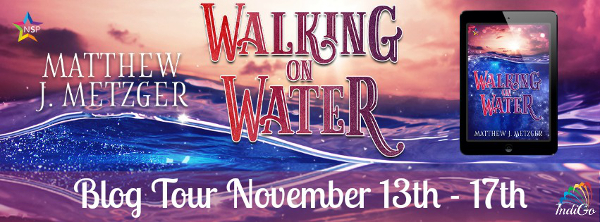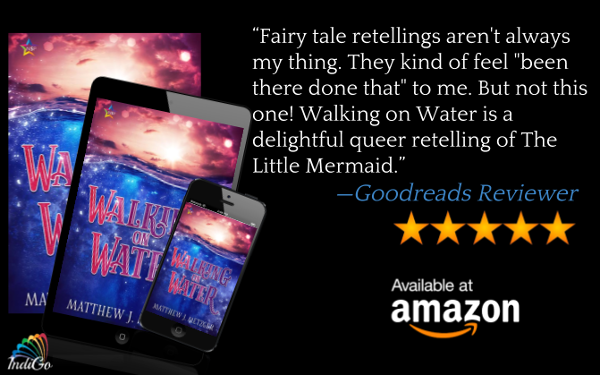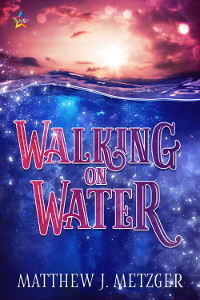
I write romance. Romance comes with happy endings. But what does a happy ending look like? One man’s heaven is another man’s hell and all that jazz—so what constitutes a happy ending?
To me, a happy ending depends on the character being happy at the end. Therefore, happy endings can come in different forms. One book may end in a baby because that’s all the couple ever wanted, another may end in that glorious negative pregnancy test. Both are happy endings if that’s what the characters want, right?
Well—sort of.
There’s also the reader to consider. Pragmatically speaking, your readers have to want the same outcome that the characters do, or they aren’t going to like the ending. And if readers are unhappy about the ending…well, it might fit the technical definition of happy ending, but nobody’s going to say that.
That’s where queer fiction can have a particular happy ending trope that can be…somewhat problematic.
Reconciliation arcs.
I’ve lost count of the number of queer stories I’ve read where a homophobic, biphobic or transphobic loved one (usually a relative, but sometimes even the love interest themselves) is or has been abusive in the past when a character has come out or been outed as queer, and the story insists on a reconciliation arc so it can have a happy ending. Unless the character is forgiven, the hurt forgotten, and everyone goes off into the sunset together, it seems there can’t be this happy ending.
Bullshit.
My aunt thinks I’m diseased and shouldn’t be allowed near children. My brother thinks I’ve been poisoned by lefty ideology and doesn’t speak to me unless absolutely necessary. My best friend stopped talking to me after I came out as a man. Fellow authors have said people like me aren’t welcome in queer fiction, because it’s for straight women writing gay men, and nothing else.
And my happy ending involves cutting them out of my life, and moving on with it. Not reconciliation. Not forgiveness. And I would thank stories to stop pushing this reconciliation arc on people like me.
Because what it does is tell me that if I want to be happy, I have to forgive my aunt for calling me a disgrace to the family. I have to forgive my brother for telling me to get over myself and stop wanting to be a freak. I have to forgive my best friend for calling me broken and dropping me like a hot rock when it turned out I wasn’t a girl after all. I have to forgive those women—and there’s a lot of them—for telling me I don’t have the right to be here. And if I can’t or won’t forgive them, I can’t find happiness.
Say it with me now: bull. Shit!
Happy endings are about what you want. And sometimes cutting the toxic people out of my life, and moving on without them, is the happiest you will ever be.
The hero of my latest story is told he is no longer his father’s child, because he is a man of the sky instead of a woman of the water. My hero walks away.
*****

Excerpt
Walking on Water
Matthew J. Metzger © 2017
All Rights Reserved
Chapter One
When the sand settled, only silence remained.
The explosion had gone on for what felt like forever—a great boom that shuddered through the water, a shadow that had borne down on the nest like the end of the world had come, and then nothing but panicked escape from the crushing water, the darkness, and the suffocating whirlwind of sand and stones. In the terror, it had seemed like it would never end.
But it did end, eventually. When it did, Calla lay hidden in the gardens, deafened and dazed. She was shivering, though it wasn’t cold. An attack. They had been attacked. By what? Orcas and rival clans could hardly end the world. And what would wish to attack them so?
She took a breath. And another. Her attempts to calm herself felt pathetic and weak, like the desperate attempts of a mewling child. Where was Father? Her sisters? Where even the crabs that chattered and scuttled amongst the bushes? She was alone in the silent gardens, and Calla had never been alone before.
Slowly, she reached out. Slipped through the towering trunks, to the very edge of the gardens, to where the noise had come from. Drew aside a fern and—
Ducked down, clapping a hand over her mouth to prevent the gasp.
A giant beast lay in the courtyard.
Still. Oh, great seas, be still. She held her breath and closed her eyes. It had to be an orca, a beast so huge, and it would see her if she moved.
Yet even in her fear, Calla knew that wasn’t quite right.
Orcas didn’t come this far south—did they? Father had said they would be undisturbed here. Father had said.
She peeked again. Daring. The beast didn’t move.
Nor was it an orca. It was impossible, too huge even for that. Oh, she’d not seen an orca since she’d been a merling, but they’d never been that big. It had squashed the courtyard flat under its great belly, its tail and head—though she couldn’t tell one from the other—spilling out over the rocks and nests that had been homes, once. It would have crushed their occupants, surely. What beast killed by crushing?
Hesitantly, she drifted out of the garden. Her tail brushed the ferns, and she wrapped her fins around them, childishly seeking comfort.
The beast didn’t move.
In fact, it didn’t breathe. Its enormous ribcage, dark and broken, was punctured by a great hole, a huge gaping blackness longer than Calla’s entire body, and wider by far.
It had been slain.
Bloodless. It was quite dead. How could it be dead, how could its heart have been torn out so, without spilling blood into the water? Where was the column of red that marked its descent? Where was—
Oh.
“A cloud!”
It was no beast.
Calla fled the safety of the gardens in a flurry of excitement. No, that great oval shape was familiar. How many had scudded gently across the sky in her lifetime? How many times had she watched their passage from her window? Beautiful, dark, silent wonders. Oh, a cloud!
She rushed closer to look. How could a cloud have fallen to earth? Father had said they were simply things that happened in the sky, and no concern of theirs. But this one had fallen, lay here and near and so very touchable—and now Calla wanted to touch the sky.
It was—
She held her breath—and touched it.
Oh.
Rough. Sharp. Its body was dark against her pale hand. And hard, so very hard. She had imagined clouds to be soft and fluid, to walk on water as they did, but it wasn’t. Huge and heavy, it was a miracle that it walked at all.
And a home: tiny molluscs clung to it. As she walked her webbed fingers up the roughness and came over the crest of its enormous belly, she mourned its death. This must have killed it. Such a deep, round belly—clouds were obviously like rocks and stone, but this one had been cut in half. Exposed to the sea was a sheer, flat expanse of paleness, with great cracks in the surface. A column stuck out from the middle, and two smaller ones at head and tail. It had been impaled by something, the poor thing.
“Calla!”
The hiss reached her from far away, but Calla ignored it. The poor cloud was dead. It had been slain, and whatever had dragged it from the sky must have been immense, to wield spears like those jutting from its body. And it wasn’t here.
Clouds were harmless. Dead clouds, even more so.
“Calla, what are you doing?”
“Meri, come and see!” she called back to her sister and ducked to swim along its flattened insides. Great ropes of seaweed, twisted into impossible coils, trailed from its bones. Vast stains, dark and pink, smeared its ragged edges. When Calla peered up into the sky, at the stream of bubbles still softly rising from its innards, she could see the gentle descent of debris. It had been torn apart.
Orcas? But an orca pack would have followed it down. Sharks? Calla had never seen a shark, but Father had, long ago when he was a merling, and he’d said they were great and terrible hunters. Were sharks big enough to do it?
“Calla!”
That was not Meri’s voice. Deep and commanding, it vibrated through the water like a blow. Calla found herself swimming up the side to answer automatically, and came clear of the cloud’s gut barely in time to prevent the second shout.
Father did not like to call a second time.
“Here. Now.”
She went. At once. The immense joy at her discovery was diminished in a moment by his stern face and sterner voice, and Calla loathed it. She felt like a merling under Father’s frown and struggled to keep her face blank instead of echoing his displeased expression.
“You should stay away from such things. The guards will deal with it.”
“But Father—”
He gave her a look. She ducked her chin and drifted across to join her sisters at the window. The window. Pah. What good was the window, was seeing, when she had touched it?
“What is it?” Balta whispered, twirling her hair around her fingers.
“A cloud,” Calla said in her most impressive voice and then pushed between Meri and Balta to peer out. The guard were swarming over the cloud’s belly, poking more holes in the poor thing’s body. “Something killed it.”
Meri snorted. “Talk sense, Calla.”
“Something did!”
“You sound like a seal, grunting nonsense.”
“I do not!”
“Girls!”
They subsided under Father’s booming reprimand—although Calla snuck in a quick pinch before stopping—and returned to watching.
“Clouds don’t fall out of the sky,” Meri whispered. “It must be a shark. There’s nothing so big as a shark. Father said so.”
“Father also said sharks don’t come this far north,” Balta chirped uncertainly, still twirling her hair.
“That’s a cloud,” Calla said and peered upwards to the sky, her eyes following the great trail of bubbles, “and I bet something even bigger killed it.”
*****
 Synopsis
Synopsis
When a cloud falls to earth, Calla sets out to find what lies beyond the sky. Father says there’s nothing, but Calla knows better. Something killed that cloud; someone brought it down.
Raised on legends of fabled skymen, Calla never expected them to be real, much less save one from drowning—and lose her heart to him. Who are the men who walk on water? And how can such strange creatures be so beautiful?
Infatuated and intrigued, Calla rises out of her world in pursuit of a skyman who doesn’t even speak her language. Above the waves lies more than princes and politics. Above the sky awaits the discovery of who Calla was always meant to be. But what if it also means never going home again?
Purchase Links
NineStar Press: https://ninestarpress.com/product/walking-on-water/
Amazon: http://hyperurl.co/qdl1xf
Smashwords: https://www.smashwords.com/books/view/756168
Barnes & Noble: https://www.barnesandnoble.com/w/walking-on-water-matthew-j-metzger/1127329286
Kobo: https://www.kobo.com/us/en/ebook/walking-on-water-17
*****
Meet the Author
Matthew J. Metzger is an ace, trans author posing as a functional human being in the wilds of Yorkshire, England. Although mainly a writer of contemporary, working-class romance, he also strays into fantasy when the mood strikes. Whatever the genre, the focus is inevitably on queer characters and their relationships, be they familial, platonic, sexual, or romantic.
When not crunching numbers at his day job, or writing books by night, Matthew can be found tweeting from the gym, being used as a pillow by his cat, or trying to keep his website in some semblance of order.
Author Links
Website: http://www.matthewjmetzger.com/
Twitter: http://www.twitter.com/MatthewJMetzger
Goodreads: https://www.goodreads.com/author/show/6893941.Matthew_J_Metzger
*****
Tour Schedule
11/13 Love Bytes www.lovebytesreviews.com
11/13 The Blogger Girls thebloggergirls.com
11/13 Erotica For All http://eroticaforall.co.uk
11/13 Scattered Thoughts and Rogue Words https://scatteredthoughtsandroguewords.com
11/14 Happily Ever Chapter https://www.facebook.com/happilyeverchapter
11/14 MM Good Book Reviews http://mmgoodbookreviews.com
11/14 Bayou Book Junkie http://bayoubookjunkie.blogspot.com
11/15 Wicked Faerie’s Tales and Reviews http://wickedfaeriesreviews.blogspot.com
11/15 A Book Lover’s Dream Book Blog http://abookloversdreambookblog.com
11/16 Stories That Make You Smile https://authoraddisonalbright.com
11/16 Divine Magazine https://www.divinemagazine.biz/category/blog-tours/
11/17 Shari Sakurai http://www.sharisakurai.com
*****
Giveaway
One lucky winner will receive an ebook of their choice from NineStar Press
